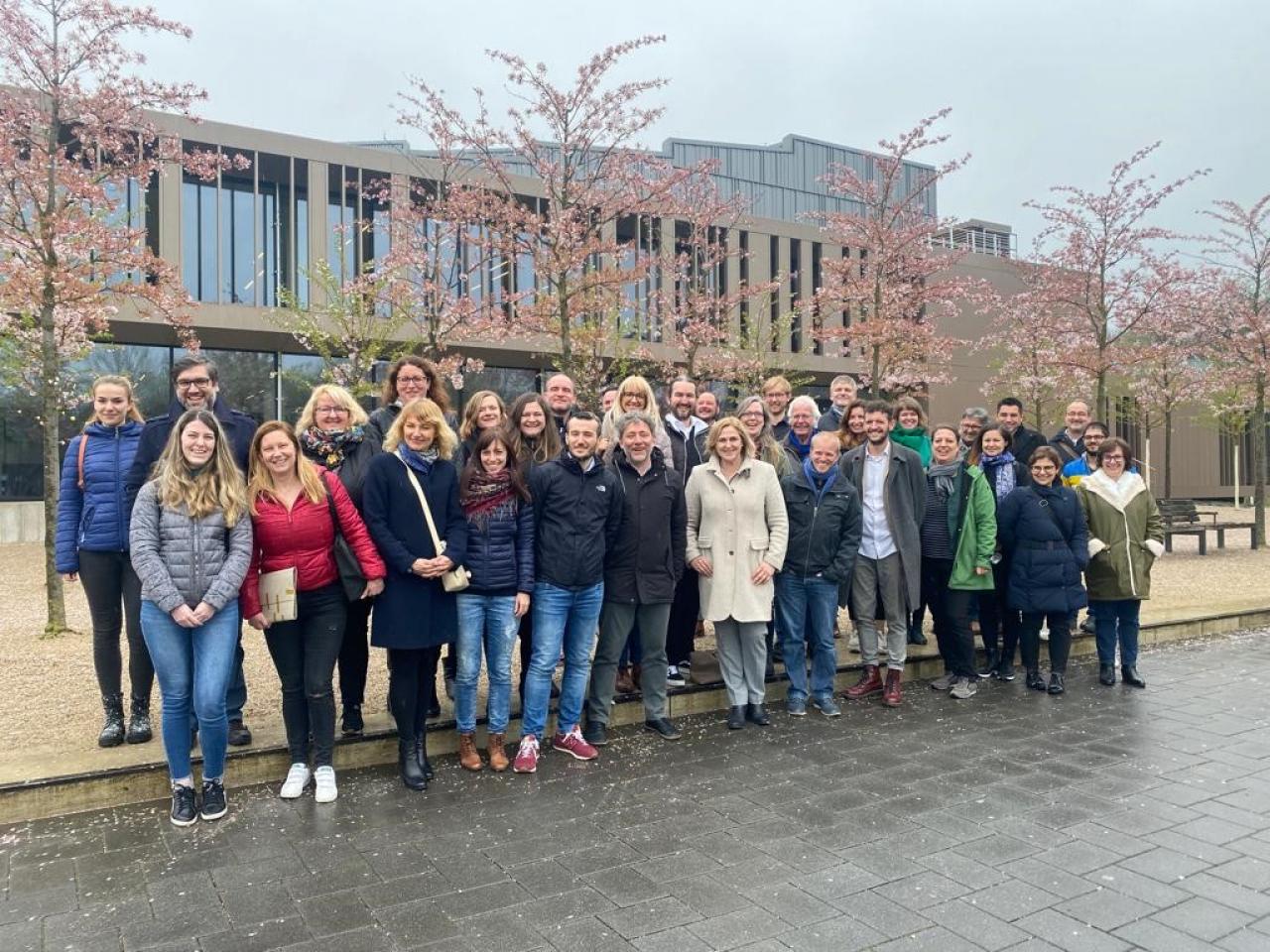
FEEDBACKS FROM AGEN’S DELEGATION FOLLOWING THE TRANSNATIONAL MEETING IN DINSLAKEN.
As part of the European Urbact program, the “Active Citizens” delegation from the city of Agen took part, on March 30 and 31st, 2022, in the 3rd Transnational Meeting in Dinslaken, Germany. During these 2 days of meeting, the 8 European cities, members of the “Active Citizens” network, were able to discuss feedback from the participatory democracy experiments implemented at the local level. Interventions and workshops, the particularity of this meeting is based on the first feedback from the experimental phases set up in each country. A moment of sharing that will make it possible to build the IAP (Integrated Action Plan) grouping together good practices and applying them on a local level beyond the URBACT program.
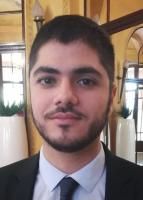
MR KASSEM, MEMBER OF THE LOCAL URBACT GROUP, TESTIFIES ON YOUNG PEOPLE’S PLACE IN PARTICIPATIVE DEMOCRACY
Alain Kassem, member of the Local Urbact Group (ULG) of the city of Agen had the opportunity to speak for the first time at the Urbact meeting. Liberal psychologist and Director of the commission of the Junior Economic Chamber of Agen, Alain, 28, has only been a member of the ULG for a few months but he already has a very strong position on young people’s place in the participative democracy.
On which integrated action into the Active Citizens approach have you worked in particular?
Initially, the commission of the Junior Economic Chamber (JCE) had already planned to set up a citizen action project for young people. The Urbact program not only enabled us to make it happen but also to finance it within the framework of Active Citizens. The objective was to involve young people from the JCE in local political life by challenging them on ideas for concrete actions to be implemented in the city of Agen. From this, several ideas of citizen action have emerged. After a democratic vote, 3 prizes were awarded to the best actions. The first prize will see his project materialize by being entirely financed by the city of Agen. What is interesting in this experiment is that we went against traditional vertical processes. We have given priority to the horizontality of processes and decisions. The groups were, in fact, free to choose their action proposal and the vote was collective, including the jury but also the other high school students.
Why did you join Active Citizens?
Young people’s place in political life is a major subject in Agen, in France but also in other European countries. They represent the tomorrow’s generation, however, there is a real difficulty in attracting them and recruiting them into political life. However, projects like Active Citizens make it possible to take them into consideration and to act concretely at a local level with actions in line with their expectations. In my view, there are two reasons for this. First, it requires a minimum investment that is difficult to reconcile with the schedule of a young worker. And secondly, the time taken to set up actions is relatively long. It is in this sense that the experiment was carried out with the Junior Economic Chamber of Agen. The objective was to reach out to young people in order to make them aware of their place as citizens and of the need to get involved in order to take concrete action at a local level. As a matter of fact, for this project, in less than a month and a half, the ideas took shape and one of the projects will be implemented in the city of Agen.The idea is not to immediately revolutionize the way of thinking but to sow seeds so that, ultimately, we would be able to create an emulsion around this type of approach and give a taste for the democratic process.
What are, for you, the keys to success that would boost citizen participation?
I believe that one of the keys to success is the involvement of young people in political life. We have to move the lines. Work in horizontal mode, use the tools and codes of these generations and meet their expectations. Obviously, the political system is not perfect. However, we can act at a local level and let these younger generations express themselves, play their role as “citizen actors” and reclaiming politics with confidence.
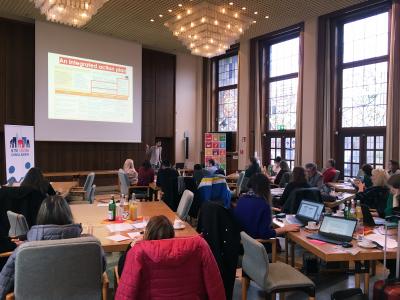
In your opinion, what were the highlights of the meeting in Dinslaken?
This type of event makes it possible to create links and discuss the various actions which have been implemented at a local level. This enables us to get inspired from the best practices and especially to learn from everyone's mistakes. Although, it is very interesting to compare the different approaches between cities. What you need to know is that each city has its own particularities. The composition of ULGs is, for example, different in size, in social composition and in age group... Which makes this type of event very rewarding due to the variety of approaches and actions implemented. One of the moments that surprised me the most was the party organized with all the participating cities. A moment of sharing and relaxation where everyone found themselves singing songs in the language of one of the partner countries. It was the first time that I had the impression of belonging not to a country but to a “European” nation.
Given the international context, what meaning does the Urbact program has?
I realized at the international meeting that whatever our differences are, the main thing is to participate in a global and common project in order, at our level, to create the tomorrow’s Europe. Bonding is essential in this special time. This brings us closer to each other and brings us together around a collective approach.
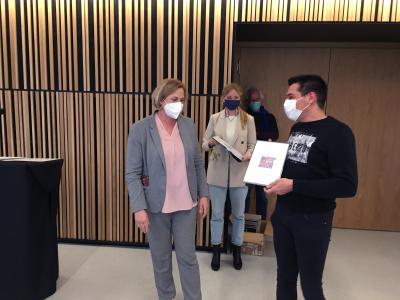
And how do you see the post-Urbact?
With this type of action, we have shown that at a local level everyone has the possibility of getting involved. We are at the very beginning of this process, and, in my opinion, it must be continued in order to keep involving citizens and young people on a daily basis. Urbact has brought us a lot in terms of support, meetings and funding... This has allowed us to lay the first stones in the building. It is up to us to make this approach last in time, to build the future and to appreciate the results of the small actions that we are trying to put in place at our level...
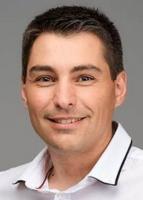
MR GESLOT, CITY COUNCILOR IN CHARGE OF THE NEIGHBORHOODS OF THE CITY OF AGEN, GIVES US HIS POINT OF VIEW ON THE ACTIVE CITIZENS NETWORK Mr Geslot, associate city councilor in charge of the northern districts of Agen and the environmental transition in all the districts of Agen, participated in the Transnational Meeting in Dinslaken in Germany on March 30 and 31, 2022. Former district councilor, he gives us his vision of the field within the framework of the implementation of Active Citizens within the city and gives us his point of view on his participation in the European meeting.
What is your role in Active Citizens?
Within the city council and more particularly within the delegation in charge of the "Citizen Challenge", we support Mr Zamboni, the deputy mayor of the city of Agen in charge of citizen participation and neighborhood life, in the implementation of this approach. We are a total of 4 delegated councilors each with 5 neighborhoods in charge and a more specific delegation: Mr Gérardi concerning citizen participation with the Active Citizens project, Claires Rives for culture, Farid SI-TAYEB for social ties and the fight against isolation, and myself in charge of the environmental transition. We therefore have a privileged relationship with our neighborhood councils and are their interface with the town hall. Concretely, our first mission is to be there to respond to their project requests. As a reminder, neighborhood councils have existed since 2008. They are democratically elected for a 6-year term and manage a budget of €375,000 per year. When the Active Citizens project was launched, we immediately saw the interest of using such a tool to improve our participative democracy within the neighbourhoods. This allows them to improve consultation and listening to citizens.
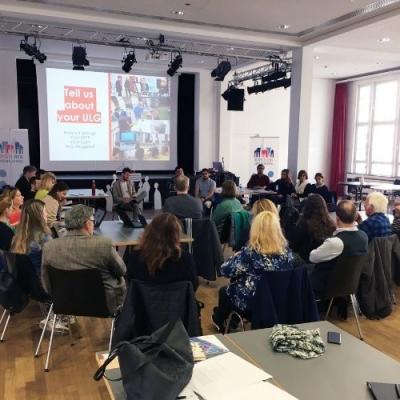
Why did you join Active Citizens?
I was made aware of participative democracy in 2019 when I was a neighborhood councilor. In fact, at that time, an audit had been carried out to have a better understanding of the actions of the neighborhoods and to reflect on the participation of citizens in local life. In 2020, I joined the city council alongside Bertrand Girardi who is in charge of the Active Citizens project. This is how I joined the project and put my experience in the field to the benefit of this approach.
How did you involve neighborhood councils in Active Citizens?
The objective is to integrate the Active Citizens approach on projects that have already been voted on, by asking residents about their opinions, or simply to collect their wishes or their ideas on future projects. Take the case of the rehabilitation of the Chopin’s park. We have thought about concrete actions to consult the inhabitants in order to collect their expectations in terms of development. We set up a tarpaulin with a plan of the park, a suggestions box, “Playmobiles” to materialize the possible layouts. This is also the case for the experiment on the location of Voluntary Contribution Points. In fact, each citizen was able to give their opinion on their location wishes by applying stickers on a map, which made it possible to identify a precise mapping of the collection points.
You are particularly involved in the environmental transition, have certain projects in line with Active Citizens been able get through?
It is, in fact, a strong commitment that was made by the city team and the mayor during the election campaign. A budget of €75,000 is allocated to all neighborhoods for ecological and sustainable projects. Yes, Active Citizens gets completely within this framework, especially since there is a strong expectation from citizens on these subjects. For example, for the re-vegetablization of Place Jasmin, we started with the planting of 15 trees. After consultation with the citizens of the neighborhood, 25 trees were planted!
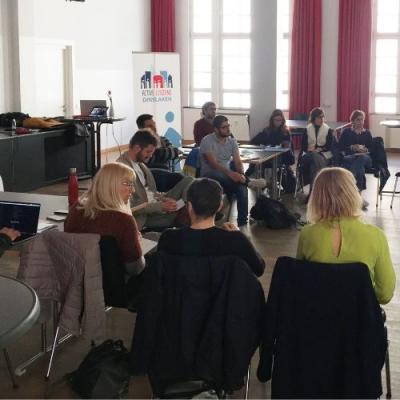
In your opinion, what were the highlights of the meeting in Dinslaken?
One of the key moments was the workshops. Everyone was able to discuss their feedback but also the difficulties encountered during the implementation of these experiments. In general, it is very interesting to discuss with our European colleagues who have a different culture and idea of participative democracy. The actions implemented are often different, which makes the subject very rich. At the end of the Urbact program, all these actions will be available for consultation on a common tool, the Integrated Action Plan (PAI). This will allow us, according to our needs, to implement them at a local level.
Given the international context, what meaning does the Urbact program has?
We mentioned it during the meeting, in particular with the Estonian, Czech and Romanian delegations who are even more concerned by this subject. This Urbact program strengthens European ties. In France, there is a certain skepticism about Europe. It is also our role to show that the Active Citizens project has been set up thanks to funding from the European Commission and exchanges between members of the European Union. We have to show that Europe is not only “requirements” but that it also allows a certain number of positive and sustainable projects to materialize.
Can these European experiments be truly transposable in a city like Agen?
Take the example of the city of Santa Maria da Feira in Portugal. They have set up "thematic" municipal councils on subjects such as disability, youth, the environment... They have been confronted with a low rate of citizen engagement over time. For our part, we were able to overcome this problem by proposing to democratically elect neighborhood councilors for a 6-year term. For Portugal, this is one of the solutions to be explored to promote the involvement of citizens in the long term.
And how do you envisage post-Urbact?
What is quite frustrating is that the program is coming to an end and we are only just beginning to get the feedback on the firsts experiments carried out. This is as well how it works ! In fact, the Urbact program is there to promote the start of the process. We are going to move on to the implementation phase of the experiements in all the districts. We are thinking about a solution to keep the ties with the other cities and discuss the feedback from this phase. Although, we are thinking about actions to strengthen participative democracy in the long term within neighborhood councils and to raise citizens'awareness of the involvement of local life. In any case, Urbact will remain a great toolbox that can be used at all levels.

